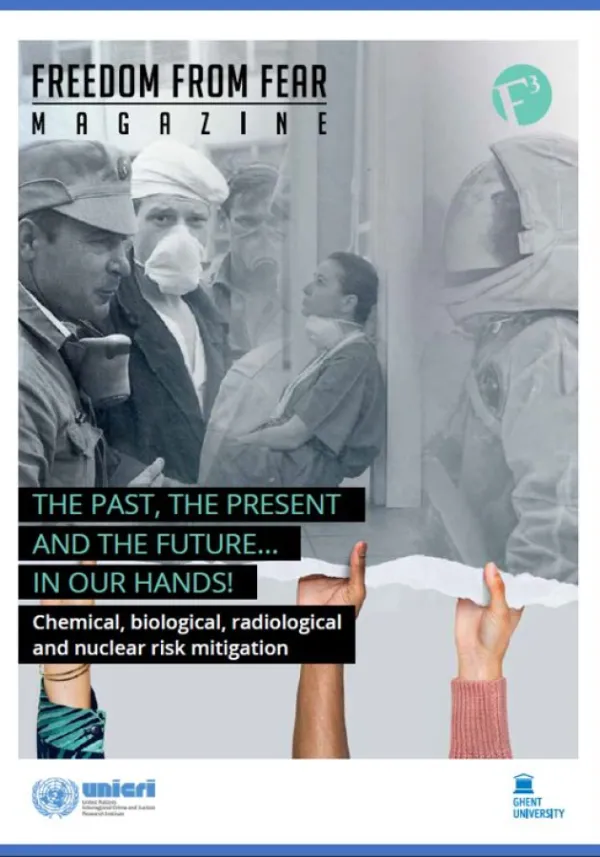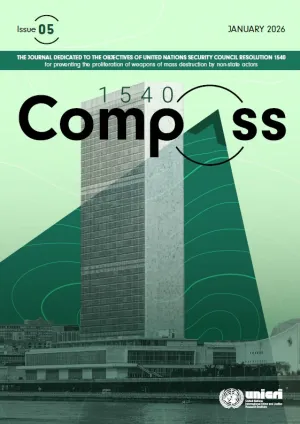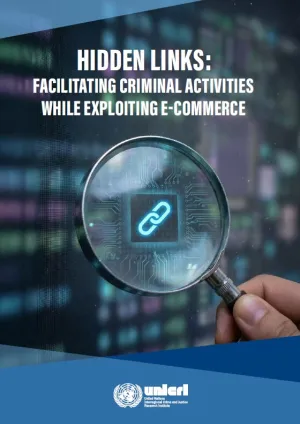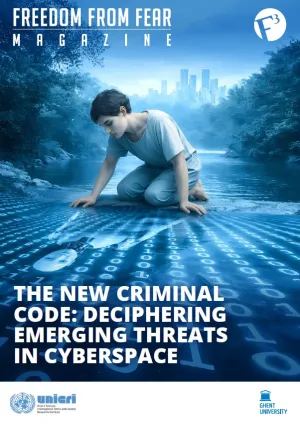When we see the Earth from space, we see ourselves as a whole. We see the unity, and not the divisions. It is such a simple image with a compelling message; one planet, one human race.” Stephen Hawking
"At the beginning of the COVID-19 pandemic, UNICRI celebrated the 10th anniversary of the Chemical, Biological, Radiological, and Nuclear (CBRN) Centers of Excellence risk mitigation programme, generously funded by the European Union. This initiative brings together stakeholders from 62 countries at the international, regional, national, and local levels to cooperate in CBRN security governance and to promote a global culture of safety and security.
Against the backdrop of the COVID-19 pandemic – the biggest crisis of our lifetime – the threat posed by dangerous CBRN agents and materials remains high, with special need to focus attention on biological threats. Criminal elements are taking advantage of vulnerabilities in society exposed by the COVID-19 pandemic. Moreover, terrorists may misuse potential CBRN agents, which is a serious concern for governments and a threat to civilian populations worldwide.
The CBRN field is prone to fragmentation, with each sector – chemical, biological, radiological, and nuclear – often studied in isolation. When this occurs, it is counterproductive, because coordinated resources, expertise, and authority are needed to address all aspects of CBRN risks.
Each of our 62 partner countries voluntarily participates and takes ownership over the CBRN work, which has contributed to the success of the responses to the biological threat posed by the COVID-19 pandemic. Ten years ago, this approach generated skepticism, especially from those who believed that there could not be adequate commitment in the absence of a politically or legally binding agreement. However, voluntary participation has proven essential to ensuring that partner countries are owners of the initiative. And their ownership can be seen in the manner in which the 62 countries that are part of the CBRN Centers of Excellence have responded to the pandemic.
During COVID-19, partner countries identified their priority needs. Our decentralized CBRN Centers of Excellence Regional Secretariats then worked with partner countries to ensure that available expertise was mobilized to respond to their specific needs, thereby reducing the impact of the pandemic in their communities. For example:
- In Africa, more than 1500 people benefited from a door-to-door awareness raising campaign and distribution of masks, as well as in-person trainings on safe and dignified burial and webinars on COVID-19 risks related to wastewater;
- In Eastern and Central Africa, the CBRN Centers prepared a joint roadmap for 2021;
- In the Gulf Cooperation Council Countries, a Regional CBRN Training Hub was inaugurated with Abu Dhabi University;
- In the Middle East, the CBRN Centers supported Lebanon in the aftermath of the tragic Beirut explosion to identify critical priorities and respond to emergency needs;
- In Central Asia, the CBRN Centers purchased necessary equipment for front-line officers to protect them from COVID-19; they also conducted awareness raising campaigns for university students;
- In South East Asia, they focused on peer-to-peer sharing of knowledge and experience on COVID-19; and
- In South East and Eastern Europe, partner countries came together to combat the spread of COVID-19 in a coordinated manner.
By adopting a flexible, country-drive approach to CBRN risks, UNICRI has also been able to take a whole of society approach by including women and youth and ensuring no one is left behind. For example, in Central Asia and Eastern Europe, a large number of female scientists shared their expertise in diagnostic medicine related to the COVID-19 pandemic response. We also partnered with the local community in Uzbekistan to host a drawing competition for schoolchildren, which raised their understanding of biorisks, such as a coronavirus outbreak.
UNICRI’s example of the CBRN Centers of Excellence concretely prevents CBRN risks by promoting good governance, a culture of safety and security, cooperation, and the transfer of best practices. We learn together and we become more effective together to achieve our ambitious goal of promoting healthy, peaceful, and inclusive societies for sustainable development.
Building upon the forward-thinking, learning, and achievements of the CBRN programme, UNICRI has a new programme, CONTACT, which was launched with the generous support of the Governments of Canada, Norway, United Kingdom and United States. CONTACT is one of UNICRI’s flagship programmes in nuclear security. It enhances capacities of state security, law enforcement and other agencies to carry out intelligence operations aimed at thwarting trafficking of radiological and nuclear (RN) materials. CONTACT focuses on fostering regional cooperation and exchange of information on RN trafficking investigations. Since its inception, CONTACT has involved countries in the Middle East, Black Sea and Southeast Asia regions.
In cooperation with UNOCT-UNCCT, UNICRI has also recently launched the new report “Advances in Science and Technology to Combat Weapons of Mass Destruction (WMD) Terrorism”. The report is an output of the United Nations Global Counter-Terrorism Coordination Compact Working Group on Emerging Threats and Critical Infrastructure Protection project on Technology and Security: Enhancing Knowledge about Advances in Science and Technology to Combat WMD Terrorism, which is funded by UNOCT-UNCCT and co-implemented with UNICRI. The Working Group promotes coordination and coherence to support Member States to address emerging terrorist threats, including those related to CBRN materials.
The threats derived from the misuse of CBRN agents and materials know no boundaries, which makes international cooperation critical. COVID-19 serves as a devastating reminder of this in the sector of biorisks. In these extremely challenging times, when people all around the world are experiencing health, economic, and social crises simultaneously, the UNICRI CBRN programme has proven to be an effective network for international cooperation based upon a common understanding of risks and a global commitment to jointly share responsibilities. UNICRI is on the front line with partner countries, facilitating priority responses to limit the negative consequences of the pandemic, and supporting Member States to plan for recovery as the pandemic subsides.
A key lesson learned from the CBRN programme is the importance of protecting communities. Awareness of CBRN risks must be raised across the public at large, starting in local communities with CBRN stakeholders and extending to community leaders, NGOs, media, universities, students, and parents.
This issue of the Freedom From Fear Magazine focuses on CBRN risk mitigation to honor the victims of CBRN catastrophes, who guide us in our quest for lasting peace and security."
Antonia Marie De Meo, Director of UNICRI
Contents:
- Chemical, Biological, Radiological and Nuclear Risk Mitigation: a Model for Community Driven Responses - Antonia Marie De Meo
- Facing today’s biorisks: The work of the United Nations Biorisk Working Group (UN-BRWG): towards action in strengthening the international community’s response and in improving prevention - Francesco Marelli
- Interview with Ms. Angelica Liao-Moroz - Francesco Miorin
- Photo gallery: The European Union Chemical, Biological, Radiological and Nuclear (CBRN) Risk Mitigation Centres of Excellence (CoE) Initiative (EU CBRN CoE)
- Interview with the Heads of the Secretariats of the European Union Chemical, Biological, Radiological and Nuclear Risk Mitigation Initiative (EU CBRN CoE) - Julie Busch
- Chemical, Biological, Radiological and Nuclear Exercise ARZ 2021
- Responding to the threat of trafficking in radiological and nuclear material through intelligence and law enforcement operations. The Georgian experience - Francesco Miorin
- Towards a sustainable CBRN risk mitigation policy in Lebanon: a success story in building an effective institutional setting - Adil Radoini and Kathy Carroll
- Crime scene investigation in a chemical, biological, radiological and nuclear (CBRN) context - Marián Kolenčík
- UNICRI’s efforts in sustaining the Chemical and Biological forensic capabilities of its member states - Talgat Toleubayev
- Attempts by non-state actors to disrupt COVID-19 vaccination efforts, deliberately transmit the virus and profit from the sale of counterfeit vaccines, therapeutics and equipment - Francesco Marelli and R. Alexander Hamilton
- Infocus - Infodemic: Right-wing extremist groups and the risk of disinformation during the COVID-19 pandemic - Mariana Díaz García
- Women in CBRN: Challenges and Success Stories from the Middle East during the COVID-19 pandemic - Heba Mariey
- Infocus - What role does language play when reporting on male violence against women? - Katy Carroll
- How can national authorities enhance CBRN hazardous waste management? Less waste and increased awareness - Yaugen Ryzhykau
- Why is chemical and biological waste management relevant to chemical, biological, radiological, nuclear, and explosive material risk management? - Hendrik Visser
- The cyber-threat against chemical, biological, radiological and nuclear (CBRN) facilities - Adil Radoini and Muznah Siddiqui
- Infocus - If healthcare doesn’t strengthen its cybersecurity, it could soon be in critical condition - Stéphane Duguin
- The dumb and the dangerous road ahead - Hedi Nasheri
- Infocus - COVID-19 and the erosion of disability rights - Brooke Ellison
- Infocus - Risk-based approaches toartificial intelligence (AI) governance - Prateek Sibal
- The Potential for Dual-Use of Protein-Folding Prediction - Sterling Sawaya, Taner Kuru and Thomas A. Campbell
- Infocus - Higher Education Institutions (HEIs) and SDG 16: Inter- and transdisciplinary cooperation towards impact - Noel Klima, Juliana Martins Vasconcelos Senra and Jasmine De Backer
- Photo reportage: We are all vulnerable - Dimitri Dimitracacos



